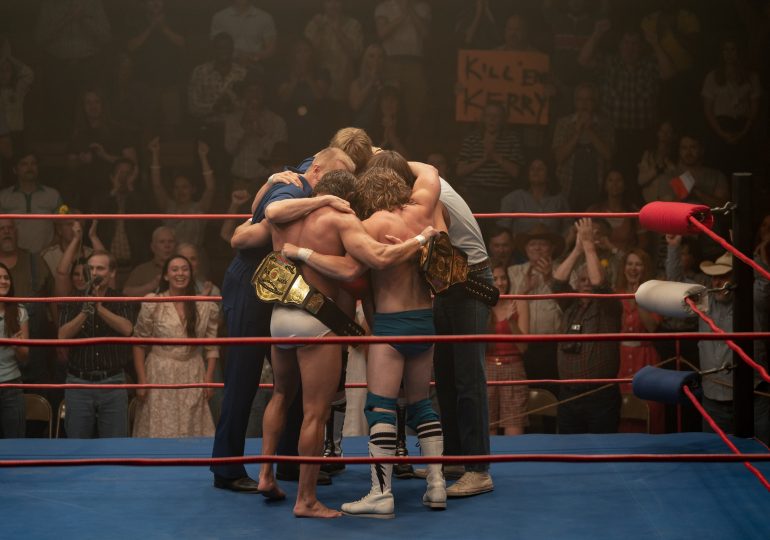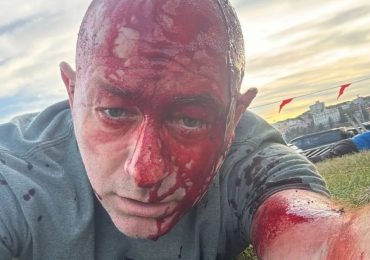Early on in The Iron Claw, NWA World Heavyweight Champion Harley Race throws Kevin Von Erich (Zac Efron) out of the ring and suplexes him onto the non-padded floor. Kevin’s entire body tenses upon contact. The rapturous crowd’s cheers become almost as fuzzy as his gaze as his arms spasm and his chest rattles with shallow, halting breaths. He lies stunned for a moment before slowly and agonizingly dragging himself back into the ring just in time to make the ref’s ten count. Backstage after the match, his father (Holt McCallany) criticizes his oldest living son for how long it took him to get back into the ring. Kevin tries to explain that he didn’t know he was going to be thrown and couldn’t have prepared for it, but the legendary Fritz Von Erich is unmoved. That’s just how the stars test you.
[time-brightcove not-tgx=”true”]
These brief moments manage to impart an impressive amount of information to the viewer, regardless of their level of familiarity with the still fairly maligned and misunderstood world of professional wrestling: The often brutal nature of both the business and the wrestling itself. The less than perfectly distinct line between scripted and real combat. How much it hurts to be thrown against a hard surface, regardless of whether you saw it coming.
With its larger-than-life characters, spectacular physical displays, and compelling—not to mention frequently tragic—real-life stories, pro wrestling seems primed for cinematic treatment. And yet there aren’t many films that attempt to tackle the topic with any complexity, and even fewer manage to do it justice. For every The Wrestler, there’s a No Holds Barred, the 1989 Hulk Hogan vehicle about a plucky WWF Champion battling evil corporate overlords, which somehow fails to capture neither the rich drama that can happen outside of the ring nor the outrageous magic inside of it. Or 2000’s Ready To Rumble, a comedy so inane that it comes across as a backhanded love letter at best, despite being made by ostensible fans and starring a chunk of the WCW roster.
What seems to be missing in many cases is something that The Iron Claw, which is directed by Sean Durkin and co-stars Jeremy Allen White, Harris Dickinson, and Stanley Simons as Kerry, David, and Mike Von Erich respectively, demonstrates in scenes like the one above: taking wrestling seriously as an art form and a craft. This doesn’t require reverence. Wrestling can be absurd and ridiculous and full of complicated human beings and the occasional outright monster, and none of that should be ignored or glossed over. (All of those things, after all, lend themselves to entertainment.) If a more venerable combat sport like boxing can handle complex portraits of its business and the people in it in films like Fat City and Raging Bull, its carny cousin can take it, too. But too few movies about that world have treated their characters as talented, trained, and dedicated performers whose work can take a significant toll on their physical and mental wellbeing. And it’s bad for both wrestling and cinema alike.
Read more: Why Sports Movies Are Making a Glorious Comeback in 2023
The stakes for a quality wrestling film
One of the greatest impediments to a better understanding of wrestling outside of the relatively niche audience that it currently attracts is the sweeping and oversimplified dismissal that it’s “fake.” Far too many people have taken the fact that the fights are scripted and performed by people who are not (for the most part) intentionally trying to hurt each other to mean that nothing of consequence happens in or out of the ring. This tends to lead to assumptions that wrestling involves no skill or artistry and comes with no risk, making the entire craft and anyone who chooses to participate in it little more than a joke. This “fakeness” was such a popular talking point in the 1990s that Bill Maher spent an episode of Politically Incorrect smarmily goading his WCW superstar guests with lines like “there’s never a bruise on any of you,” and “your audience, they’re in on the joke, right?” (“So is your audience, man,” Roddy Piper replied before dropping his pants to show off his titanium hip.)
As a fan and a writer who has occasionally covered wrestling for the past two decades, I can’t say that I’ve seen the general attitude toward it evolve that much. Given this overall lack of cultural awareness or appreciation, any filmmaker who wants to tell a meaningful wrestling story that will have appeal outside of that insular world have to make a solid case for the technical abilities, creativity, and sometimes grueling levels of activity involved in wrestling matches—not to mention the massive physical and mental toll that can come with performing them regularly.
This isn’t to say that every film that tackles wrestling needs to portray it with unflinching verisimilitude. Nacho Libre (2006), in which Jack Black plays a cook at a monastery who starts moonlighting as a masked wrestler named Nacho, keeps its violence cartoonish and its in-ring stakes low while telling a charming story that, crucially, doesn’t treat its subject matter cartoonishly. Even lighter fare can benefit from a touch of wrestling realism, though. The emotional climax of The Peanut Butter Falcon (2019), a dramedy featuring a young man with Down syndrome (Zack Gottsagen) on the lam from a care facility and dreaming of attending a wrestling school run by his hero, hinges on the upstart being forced to defend himself when a grizzled veteran starts taking liberties and hurling abuse at him. The sweet and playful tone of My Dad Is A Heel Wrestler, a 2018 Japanese family film about a masked bad guy torn between doing his dastardly job and making his son proud, is anchored by a surprisingly honest look at the impact that injuries have had on its titular character’s career and life. (The fact that the movie stars Hiroshi Tanahashi, the beloved ace of New Japan Pro Wrestling who is also struggling with long-term injuries and the wear and tear of his legendary career in the ring, adds another layer of pathos to the film.)
In drama, a degree of knowledge and respect for wrestling can provide the foundation for complex characters and stories. Darren Aronofsky’s 2008 film The Wrestler, considered by many fans and insiders alike to be the best film to touch on their world, offers a meticulous look at the demands and repercussions of wrestling, and the maladaptive coping mechanisms that many performers develop in order to manage that physical and mental suffering. It’s a fascinating portrait of craft in and of itself, but it also provides powerful context for a thoroughly flawed human being’s fading second act in the story of Mickey Rourke’s Randy “The Ram” Robinson.
A willingness to treat wrestling seriously can also make for some particularly dangerous and devastating moments. Night and the City, a 1950 noir with Gene Tierney and Pioneer Era Professional Wrestling Hall of Famer Stanislaus Zbyszko, tells the story of a hustler’s shady attempt to become a promoter. The gaping, bleeding heart of the movie is a long and brutal shoot fight (essentially a match that is no longer scripted or in friendly spirits) between an aging veteran and a flashy upstart. The action is harrowing to watch and the fallout is heartbreaking, but what’s most unnerving of all is the subtle but undeniable betrayal of a code.
Iron Claw’s clear-eyed take on the real Von Erich family
The Von Erich family’s real life story is an exceptionally devastating example of the physical and mental toll that wrestling can take on the people involved. Kevin, David, Kerry, Mike, and Chris, sons of heel wrestler World Class Championship Wrestling promotion owner Fritz Von Erich, were the pride of WCCW and their Texan fanbase. Handsome, charismatic, and athletic, Kevin, David, and Kerry began to establish themselves as trio and singles wrestlers with feuds against The Fabulous Freebirds, Ric Flair, and Harley Race in the late 1970s and early 1980s. But their seemingly inevitable rise to the top began to fall apart when David died, officially of enteritis although suspected by many of his colleagues to be related to drugs, in Japan in 1984. Attempts to bring Michael and Chris, who were far less suited to the physical demands of wrestling, into the family business only resulted in further injuries and suffering. By 1993, only Kevin remained. And this is, sadly, only the Cliff Notes version. (It’s too much tragedy to completely contain in one film. Chris does not appear—or exist at all—in The Iron Claw. Durkin addressed the reasoning behind his absence in a recent Vulture interview.)
It’s imperative that anyone who wants to tell any portion of this family’s story treat it with the gravity it deserves. For purely human reasons, it would be exploitative and downright cruel to take on their tragedy while treating the thing that was both their lifeblood and their ruin as a trifle. From an artistic standpoint, it would read as sensationalist and hollow.
Mercifully, The Iron Claw’s blend of reverence and healthy skepticism for its characters’ calling is clear throughout, and conveyed to uninitiated audiences with an impressively deft touch. Basic workings and philosophy are established without any clunky exposition. A casual chat between wrestlers backstage before a match, for example, illustrates the planning and execution of a wrestling match, as well as the level of creative vision and skill involved. On a date, Kevin explains why belts matter in a business where winners aren’t determined through regulated athletic combat.
The risk and the cumulative damage of each moment in the ring is always evident in the actors’ expressions, body language, and general composure. Nods to steroids and drugs, which help the Von Erichs and their colleagues achieve their larger-than-life physical proportions as well as dull the pain of their profession, are slight to the point of abstraction, but they’re acknowledged. The intoxicating but ultimately suffocating mix of glory, passion, tradition, history, artistry, commerce, familial pressure, suffering, and a lack of other options that drew these men to wrestling and kept them there at all costs should be as evident to someone who comes to the film cold as it is to people who have been familiar with their story for years.
The Iron Claw is not a 100% faithful historical recreation. Many of the artistic liberties that it takes with the source material were likely necessary to condense the family’s haunting legacy into a feature-length narrative. (For non-wrestling fans who are interested in learning more about the film’s inspiration, “The Last of the Von Erichs” from the first season of the documentary series Dark Side of the Ring, provides an accessible entry point.) The particulars of the in-ring action aren’t perfect, and will likely be a matter of some debate among exacting wrestling fans for years to come. What it does capture, though, is some of the essence of that world and why it matters. The struggle and the suffering and the sometimes all too fleeting moments that justify the cost all feel real.
Leave a comment
















